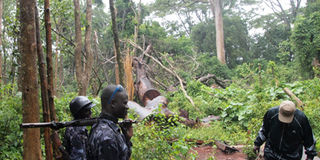Trade in Beyo trees booms despite ban

Endangered trees. Environment Protection Police Unit officers at one of the forests in Adjumani District where Beyo tree is cut. FILE PHOTO
What you need to know:
Accusation. District officials accuse security officers of conniving with illegal timber dealers to violate ban.
Illegal trade and harvest of Afzelia Africana tree, commonly known as Beyo tree within Acholi Sub-region and Adjumani District in West Nile, is increasingly putting the endangered tree species on the verge of extinction despite a government ban on its harvest.
In December last year, the State minister for Environment, Ms Mary Goretti Kitutu, issued a temporary suspension of cutting, transportation, and sale of Afzelia Africana trees, shea nut trees, and their products.
Ms Kimono in a circular seen by Daily Monitor, noted that government was still in the process of reviewing and harmonising the licensing, harvesting and movement of the products before resuming operations.
Leaders in the northern region are now pointing fingers at the district security officials whom they accuse of working hand in hand with illegal timber dealers to cut down Beyo trees.
Late last month, an operation mounted by local leaders saw three trucks fully loaded with Beyo logs impounded in Gulu District while another truck full of Beyo logs was seized in Lamwo District a week later.
Illegal cutting of the tree in Lamwo District is being conducted in the four sub-counties of Palabek Ogili, Lukung, Padibe West and Palabek Kal.
According to local leaders at least four trucks loaded with Beyo logs are intercepted weekly.
Mr John Thomas Ogwok, the Lamwo District chairperson, told Daily Monitor in a recent interview that some leaders and security operatives in the district connive with timber dealers to cut down Beyo trees.
“Our fight against illegal tree cutting has been hampered by connivance of security officials in the district. We have many high ranking Uganda People’s Defence Forces soldiers engaged in the trade of these trees,” Mr Ogwok said.
The Gulu District Chairperson, Mr Martin Ojara Mapenduzi, reiterated Mr Ogwok’s claim.
Mr Mapenduzi accused the Aswa Region Environmental Police coordinator, Inspector of Police Alex Nkayarwa, being involved in the illegal felling of Beyo trees in Paicho Sub-county.
He alleged that Mr Nkayarwa was in January intercepted by local authorities after cutting down seven mature Beyo trees in Paicho Sub-county, which he bought at only Shs120,000.
“We have investigated and found out Mr Nkayarwa is involved in illegal timber logging in the district. He is an environmental monster yet he is supposed to spearhead the protection of the endangered tree species,” Mr Mapenduzi said.
He urged the Inspector General of Police, Mr Martins Okoth-Ochola, to remove Mr Nkayarwa from the region and prosecute him for the alleged crime.
But when contacted, Mr Nkayarwa denied any wrongdoing, saying the allegations levelled against him were aimed at tarnishing his name.
Mr Nkayarwa instead accused the district leadership of involvement in felling of Beyo trees.
Mr Mapenduzi said the district authorities would use the impounded Beyo logs to make desks and benches for primary schools and government health facilities.
He raised fears that the current rate of tree cutting in the region is bound to have adverse effects on the environment if unchecked.
TRADE ISSUES
The tree: Afzeila Africana tree species, considered endangered, are only found in the Acholi and West Nile sub-regions in northern Uganda.
Market for timber: The tree species is endangered due to rampant illegal harvesting and trade in the logs. There is a lucrative market for Afzeila Africana timber in Asian countries where they are used for making furniture and crafts.
Reduced forest cover: A 2016 Joint Water and Environment Sector Review Report revealed that forest cover countrywide has reduced from 24 per cent in 1990 to just 11 per cent in 2015.
Ban: The dwindling population of Beyo trees has forced the Ministry of Water and Environment to suspend any cutting, transportation and sale of tree logs and products made from them.




